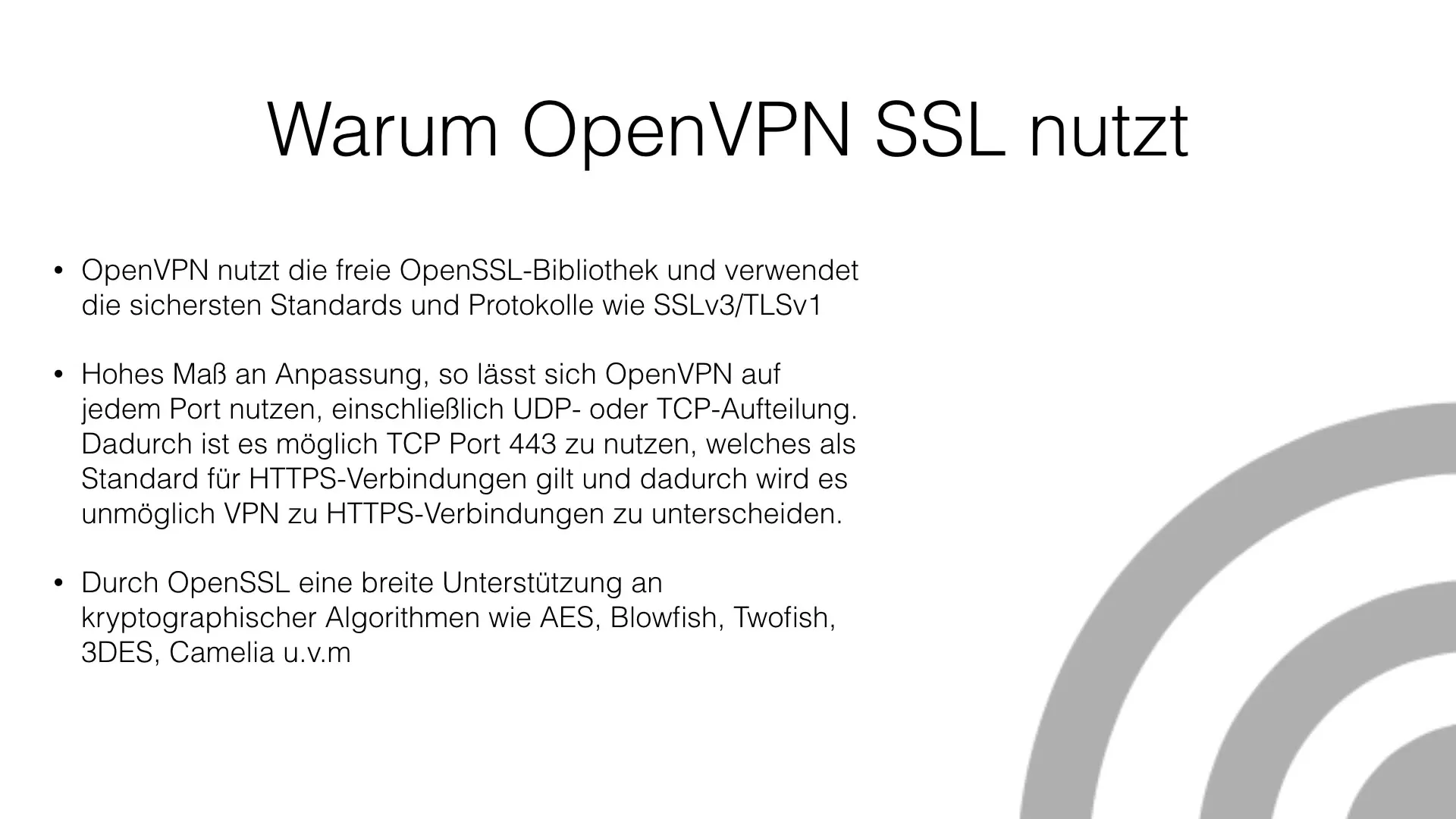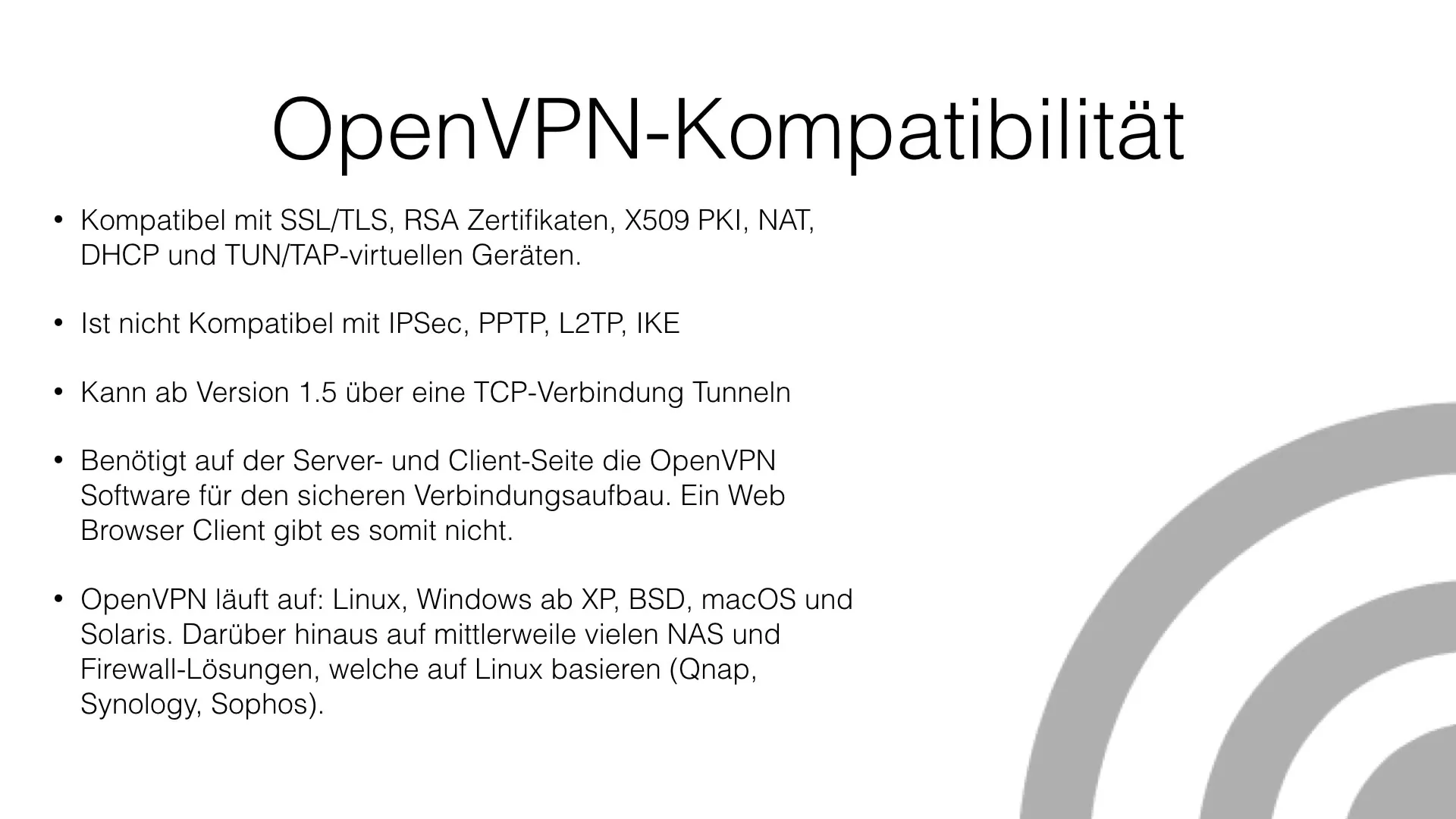OpenVPN is one of the most widely used technologies for establishing secure connections over the Internet. The use of OpenVPN comes with many advantages, particularly regarding security and flexibility. In this tutorial, we focus on the compatibility of OpenVPN and explain why using SSL VPNs is beneficial.
Key Insights
OpenVPN uses the OpenSSL library and offers broad support for various cryptographic algorithms. The technology is compatible with major standards like SSL and TLS. OpenVPN can operate over TCP and UDP and provides the ability to obfuscate connections efficiently. However, OpenVPN is not compatible with all protocols, which should be taken into consideration when planning a VPN setup.
The Basics of OpenVPN Compatibility
OpenVPN utilizes the OpenSSL library, meaning it can rely on the most secure standards and protocols, including SSL V3 and TLS V1. These standards ensure a high level of security for the data transmitted over the VPN.
The use of OpenVPN allows for a division of connections into two main protocols: TCP (Transmission Control Protocol) and UDP (User Datagram Protocol). This flexibility is crucial, as you can choose the protocol best suited for your application based on your requirements and network infrastructure.

For instance, if you use TCP port 443 for OpenVPN, the traffic can be shaped to look like a regular HTTPS connection. This makes it difficult for a potential attacker or a network analyst to detect that a VPN service is being used, and it is particularly useful in restrictive networks.
Supported Cryptographic Algorithms
OpenVPN supports a variety of cryptographic algorithms. Common algorithms include AES, Blowfish, 3DES, and Camellia. AES is considered one of the most secure algorithms and is the recommended choice for most applications. However, it is not enough to just choose one algorithm; the security requirements of your network should also be considered.
Flexibility is not only ensured by the selection of protocols but also by supporting various algorithms. This means you can adjust the security settings to address the specific challenges of your network.
Compatibility with Different Certificates
OpenVPN is compatible with SSL/TLS RSA certificates. These certificates are crucial for secure authentication between clients and the server. Another important element is the X.509 PKI (Public Key Infrastructure), which plays a central role in the security architecture of OpenVPN.

Additionally, OpenVPN supports NAT (Network Address Translation) and various virtual network interfaces. This allows you to create a variety of configurations for different use cases. However, note that OpenVPN is not compatible with all protocols.
Compatibility Limitations
OpenVPN is not compatible with protocols like PPTP, L2TP/IKE, and some other protocols. This means you cannot attempt to connect a PPTP client with OpenVPN, as these technologies operate fundamentally differently.
Starting with version 1.5, OpenVPN introduced the ability to tunnel connections over TCP, which provides new flexibility in its use. Here, port 443 is also significant in minimizing potential weaknesses regarding traffic detectability.
The Software Requirements and Platforms
On both the client and server side, you need to install the OpenVPN software. There is no web browser client for OpenVPN, which means you must install the software locally. However, the software is widely used and supports multiple operating systems, including Linux, Windows, macOS, and Solaris.
Moreover, OpenVPN runs on many other platforms, including devices such as firewalls and various Linux-based systems. This ensures that you have a variety of options to shape your VPN according to your specific requirements.
Looking Ahead to Practice
With the knowledge to set up an OpenVPN configuration and the required software, it is now time to move on to practice. When you are ready, you can set up your own OpenVPN on a Linux server and access it from various devices such as Windows, macOS, Android, and iOS.
Come well prepared for the next section, where we will go through the installation and configuration step by step.
Summary - OpenVPN Compatibility and Setup
OpenVPN provides a flexible, secure, and customizable solution for creating VPN connections. Through its compatibility with secure protocols and various cryptographic algorithms, OpenVPN can be adapted to diverse technical circumstances, making it an optimal choice for many applications.
Frequently Asked Questions
What is OpenVPN?OpenVPN is an open-source VPN protocol that enables secure connections over the Internet.
What encryption standards does OpenVPN support?OpenVPN supports a variety of standards, including AES, Blowfish, 3DES, and Camellia.
How many operating systems does OpenVPN support?OpenVPN supports many operating systems, including Linux, Windows, macOS, and Solaris.
Is OpenVPN compatible with protocols like PPTP?No, OpenVPN is not compatible with PPTP or L2TP/IKE.
Can I use OpenVPN through a web browser?There is no web browser client for OpenVPN; the software must be installed locally.


